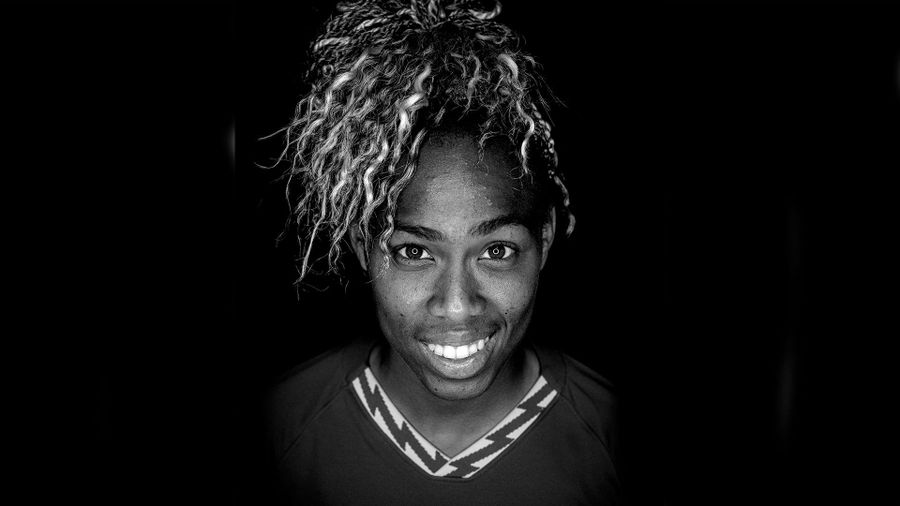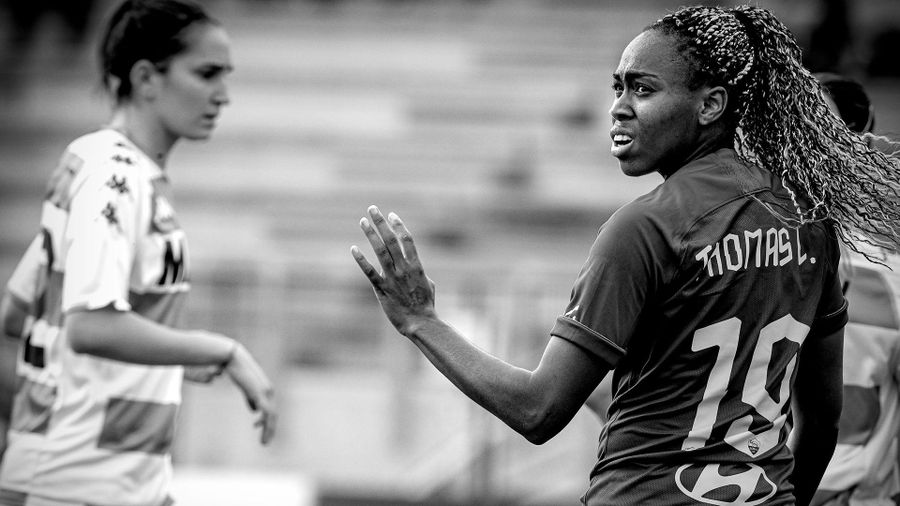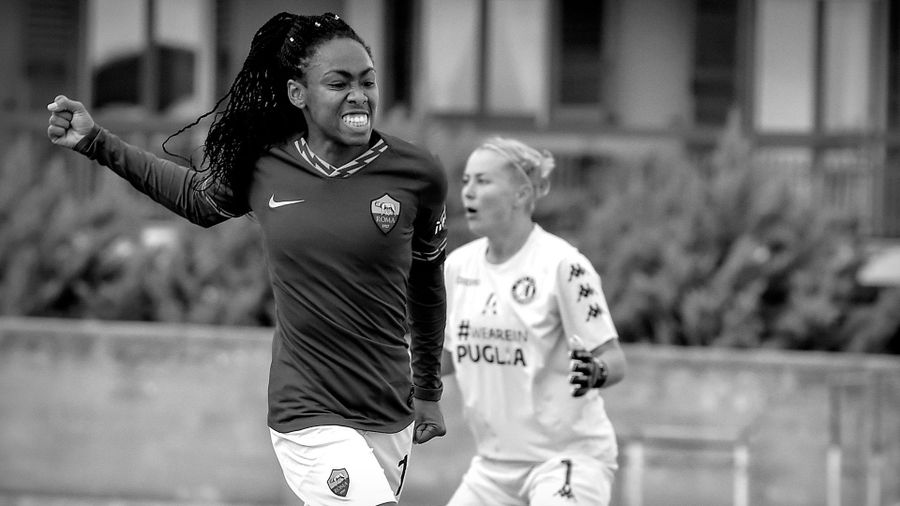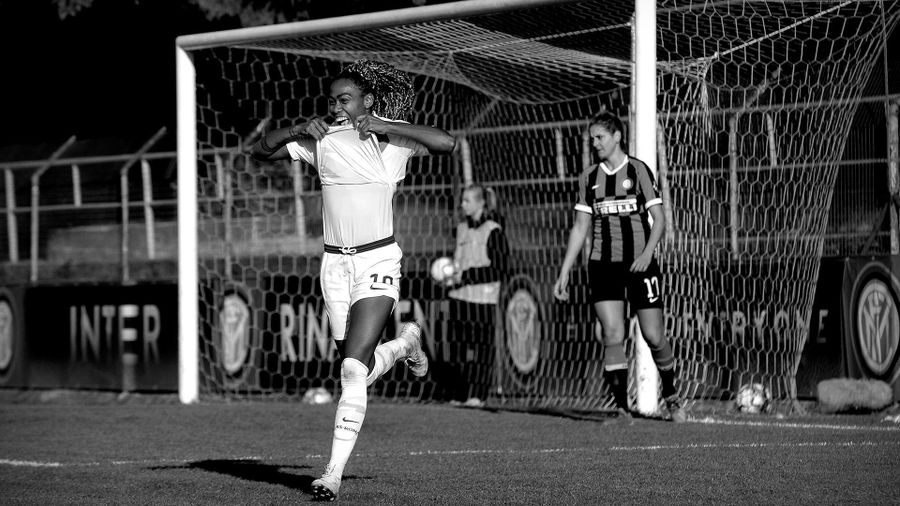

It's fair to say Lindsey Thomas has made an instant impact in Italian football - the French forward already leads Roma's scoring charts this season, in what is just her first campaign in Serie A.
From her initial experiences with the game in Guadeloupe, to the challenges and trials she went through to make it as a footballer in France, we spoke to Thomas about her journey in the women's game to date...
What were you like as a child?
“I was very quiet, calm and polite. I never caused trouble. I enjoyed playing and having fun and I seemed to get on better with my male friends. I always found it a little trickier to get on with the other girls.”
Where did you grow up?
“I was born in Guadeloupe, specifically in Saint-Claude, but I grew up living with my grandparents on Terre-de-Haut, which is a small island in the Iles-Des-Saintes archipelago to the south of Guadeloupe’s main island. I stayed there until I was 15.
"Guadeloupe is a French overseas region in the Caribbean – there’s a local language but we all speak French. It’s another region of France to all intents and purposes and we even have the Euro.”
What’s your first football memory?
“My cousin played for the first team at AJSS Les Saintes, which is the local club on the island. My grandpa would always take me to see the home games, then my cousin started inviting me to play and I really got into it. The island has a sports complex and a small stadium where the team trains and plays its games. There are also two futsal pitches at the same complex.”
How did you start out in football?
“I started playing for AJSS, the same team as my cousin, when I was seven years old. We used to have to catch a boat to the main island when we were playing other teams – I think there were eight in total. It wasn’t a girls’ team – I was the only girl on the island that played football, so it was me and 14 boys. I played with them for seven years before leaving for France.”
Did you follow French football as a youngster?
“I started following it when I was 10 years old. My favourite team was Lyon and I still like them now, plus I always used to watch the French national team. My favourite players were Thierry Henry, Karim Benzema, Franck Ribery and Juninho Pernambucano. As I grew up, I started to take a closer interest in Kylian Mbappe, Robert Lewandowski and Alexandre Lacazette when he was at Lyon.”
Would you watch matches at home with your family or with your team-mates?
“At home we didn’t have the channels that showed the French league games, so I would arrange with my team-mates to watch them. I could watch the national team at home, though. The biggest event I can remember watching was the 2006 World Cup.”
Who are your idols and role models in women’s football?
“I like to follow all of the leagues but obviously the French league is the one I know best. I really liked Dzsenifer Marozsan, Eugenie Le Sommer, Kadidiatou Diani and Amel Marji. I watched lots of games during the 2019 World Cup – I was impressed by England and also pleasantly surprised by Brazil. There’s not much you can say about the USA though. They’re a fantastic side.”
How did the opportunity arise for you to go to France?
“My coach at AJSS had gone to a tournament in Bordeaux. He found out about a girls’ team there and started looking into how I could get involved. One of the requirements was for me to get my middle school diploma, which I did in Bordeaux – after that, I was able to join the team.”
How did the move from the Caribbean to Europe go for you?
“It was tough at the start because I was completely alone. I’d never left my family before and had never been to France. I was happy that I was getting the chance to see it but I had to change my habits a lot. I lived at a boarding school and it was difficult to adapt to in the first few months, particularly because I had to sleep in shared dorm with other girls and didn’t have my own space. Gradually things improved, though.”
And what about the change from playing with boys to being part of a girls’ team?
“Initially I didn’t think too much about it and just played the way I’d always done. But then one day this girl said something to me that threw me: ‘You can’t do the same things with us that you used to do when you played with boys.’ I wasn’t really sure what she was referring too – probably she meant my intensity and things like leaving my foot in when I went in for tackles. But that comment upset me a little. I was afraid of doing the wrong thing and it had a bit of a negative impact on my development as a player during that time.”
After a year at Bordeaux, you moved to Montpellier…
“That’s right, I finished the rest of the youth categories there before signing my first contract. I really liked the city – the weather is nice and it’s right by the sea. I lived in a boarding school during the week there too, then at the weekends I stayed with a family. As soon as I turned 18, I moved into an apartment on my own – I was finally able to get my own space. I had some tough moments with the team, though, and it felt like I was having to start again from zero after every setback.”
After Montpellier you joined Basel. How did you get on in Switzerland?
“At the start I felt very insecure and shy, but after a while I settled in and had a good six months there. Then the club changed coaches and the second half of the season wasn’t as good as the first.”
What about the weather? Didn’t that make you feel further away from Guadeloupe?
“Yes, but luckily I was able to go back home for the Christmas holidays. Thinking back to it now, I definitely had to go through some difficult times that put me to the test, but at the time I just go on with it without thinking too much about it. Generally speaking, the thing I miss the most is my family rather than Guadeloupe itself, because I love it here in Europe.
“After Basel, I went back to Montpellier and then spent six months at Girondins Bordeaux, who had created their own women’s team in the meantime. The last team I played for in France was Dijon – after that I decided I wanted a new experience and that’s when I decided to come to Roma.”
When did you realise that football could become your life?
“As soon as I arrived in France, my objective was to sign a contract with a team. I knew it was going to be a long road, and even after I’d signed my first contract it still took me three years before I realise that I was actually doing it. I’ve been lucky, but I kept looking to the future and gave everything I had to achieve more.”
How did your move to Roma come about?
“I wanted a new start and I’d had enough of changing club every year in France. You don’t get a chance at a big club like Roma twice, so I was keen to accept. I liked the project and its focus on the future. I was already used to travelling and this gave me the chance to get to know a different culture.”
What differences have you noticed between the French league and the Italian league?
“In Italy we do a lot more work on fitness and tactics. Serie A is more balanced than D1 [the equivalent in France]. You still have a group of better teams, but there are four here compared with just two in France. Every match is tough and even the weaker teams on paper always try to give it a go.”
How are you finding life in Rome?
“It’s a beautiful city. I’d never been to Italy before. I love the weather, the sea isn’t far away and the people are very friendly and open. I love the team too – as always I was a bit shy with my team-mates initially, but they made me feel at ease from the off. Coach Betty Bavagnoli spends a lot of time talking to me, which is something I’ve always needed. There’s a very positive mentality here and I feel like an important part of the squad.”
You already speak excellent Italian, too!
“I started lessons in September but I found it very easy to understand, seeing as it’s not that different from French. I tried to start speaking it as quickly as possible because I know that it can be a real problem if you can’t communicate with your team-mates – I found that in Basel when I had trouble with German.”
You’ve scored nine league goals so far, but do you have a favourite match from the campaign?
“The Empoli game. It was a massive game for us and Empoli is a tough place to go. I scored to give us a 1-0 lead, they then equalised and then I scored the winner late on to make it 2-1. It was a special game and I have fond memories of it. At the other end of the spectrum is my brace away at AC Milan, which I’m still frustrated about because we dominated the game for 70 minutes, went 2-0 up and then inexplicably managed to lose it at the death.”
How have you found the enforced suspension of the league due to COVID-19?
“I was calm about it all at the start and spent a relaxed two or three weeks waiting to see how the situation would evolve, but then I got more and more tired of being at home on my own all the time – without a football, without being able to train outside and without the dressing room. I’ve had a few highs and lows – it’s not been easy at all.
"I’m desperate to get back into the swing of regular training after days and days on the treadmill. It’s made me realise just how lucky I am to do a job that I love. It’s been really hard to stay at home, without the pressure of having to prepare for games and without being able to share the day to day with my team-mates. I hope we can get going again as soon as possible.”
How have you passed the time during lockdown?
“I’ve tried to make the most of it by staying at home, but after a while you run out of things to do! I’ve done a bit of reading, sunbathed on the balcony and tried to make a decision on how to continue my university studies. I’m enrolled on a Sports Science course in France, but I’ve missed a year and I need to decide whether to continue studying remotely or switch to a course here in Rome. I’m also considering switching to study to be a nutritionist.”
Have you been watching lots of films?
“Yes, I’ve used the time to watch films in Italian to keep it fresh and keep listening to the language. I’ve seen Hunger Games, Collateral Beauty, John Wick 1, 2 and 3, Sherlock Holmes and the whole Harry Potter series.”
Looking back on your career, is there a particular piece of advice that’s been particularly important to you?
“I left home when I was very young but I’ve always taken my parents’ advice with me. They taught me to work hard if I want to achieve something, to never think that I’ve nothing else to give and to remain a simple, loyal and decent person. I was brought up well by my family and I think that proved vital when I came to France on my own. Without that, everything would have been much harder for me.”
Check out earlier entries in our Big Interview series:
AS Roma x Antonio Mirante
AS Roma x Juan Jesus
AS Roma x Diego Perotti
AS Roma x Justin Kluivert
AS Roma x Amadou Diawara
AS Roma x Jordan Veretout
AS Roma x Elisa Bartoli
AS Roma x Betty Bavagnoli
AS Roma x Chris Smalling
AS Roma x Edin Dzeko
AS Roma x Gianluca Mancini
AS Roma x Aleksandar Kolarov
AS Roma x Nicolo Zaniolo
AS Roma x Jim Pallotta
AS Roma x Cengiz Under
AS Roma x Paulo Fonseca
AS Roma x Leonardo Spinazzola






 Tickets
Tickets
 Shop
Shop








































